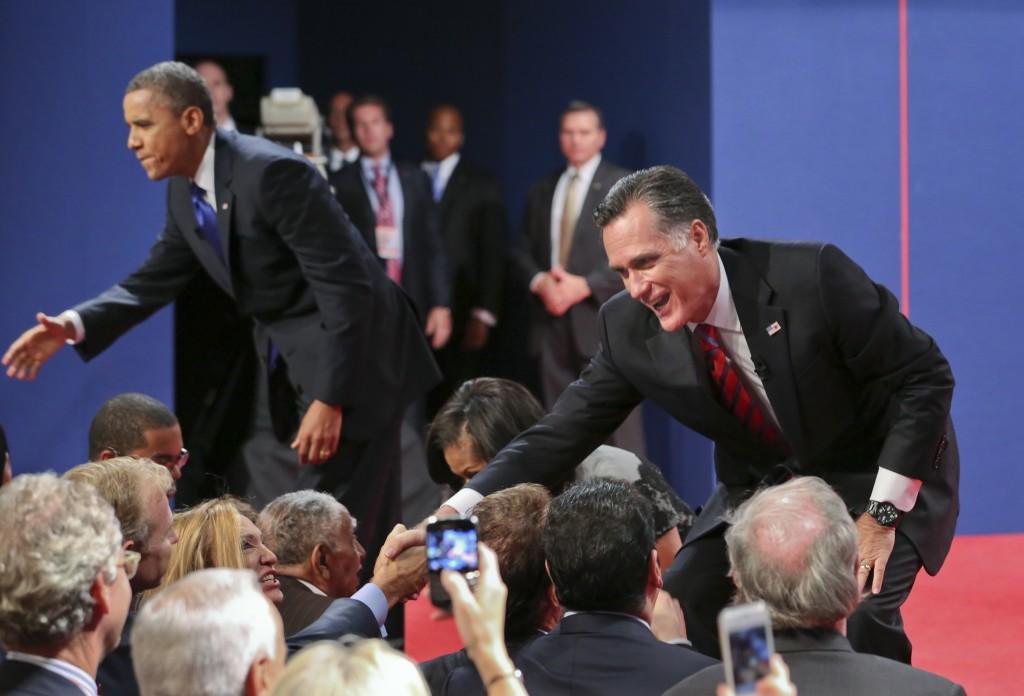Out of the Spotlight and Into the Voting Booth
October 24, 2012

After a frustrating debate season, I found the fourth and final presidential debate on Oct. 22 to be somewhat of a relief. I’m sure the setting of the debate had a lot to do with it: this time, the audience didn’t make a peep, the cameras’ tight shots on each candidate’s face never moved once for the whole occasion, and President Obama and Governor Romney sat face to face with their moderator, Journalist Bob Schieffer. Without any interruptions from the audience and under close surveillance from the cameras and their moderator, Obama and Romney had nowhere to hide. They couldn’t serenade the anxious college student in the front row, hoping to impress young people with romantic speeches on how they would get jobs for our generation. They couldn’t strut across the stage to model their machismo as they were talking, or duck their heads from the camera when they were embarrassed or at a loss for words. All either could do was answer the question posed to them.
In that sense, the fourth debate was more satisfying. I’m leaning toward the candidate with the funny name and odd resemblance to my father (of course, not for those reasons!), but the old man with the white-stranded temples argued some decent points in his own right throughout the debate as well.
However, is this fourth debate going to have a lasting impression on the American public? It seems that ever since the debate season has started, commentators and average citizens alike are fixated on Obama’s “failure” in the first round, exponentially increasing people’s doubts of whether or not he is competent enough or passionate enough about being president for a second term.
This is the root of my frustration.
Doesn’t anyone remember when Obama meticulously picked apart all of the problems with Romney’s plans for using vouchers in Medicare, only for Romney to sheepishly follow up Obama’s monologue by listing his plans for vouchers─the very same ones Obama just finished refuting—and unable to explain why his policies were better than Obama’s? Doesn’t anyone remember the ridiculous lies Romney spewed about current conditions in America’s hospitals and Obama cutting funding to college students throughout the debate? I know none of you have forgotten about Romney’s 47 percent gaffe!
But I suppose none of that resonated with people. It seems all anyone cares about in these debates is theatrics—smoke, mirrors, perfectly coordinated outfits and some damn-good hair gel. It doesn’t matter that Obama answered each question in its entirety, unlike his opponent; all people saw and heard were his dipped eyes and lukewarm inflection. What commentators perceived from Obama’s reserved demeanor as apathy and lack of preparation, I perceived as frustration and exhaustion, Obama being dryly amused by his competition.
This debate season became even more of a disappointment when Obama started resorting to theatrics by the third debate, mimicking his opponent’s humorous, yet rude behavior: going over his allotted time to speak, egging on the moderator to highlight his opponent’s mistakes, obnoxiously interrupting his opponent and fighting for the last word.
On one hand, it’s good that Obama is being responsive to what critics are saying. And I think we can all agree that Obama is under an immense amount of pressure this election season. But ultimately the man is stooping to a level that I think is hurting, not helping, his public persona as a confident leader. Let’s be honest with ourselves—if Obama had actually been as feisty as everyone says he should have been in that first debate, would he really have come off as the aggressive, self-assured leader we all want? Or would we have just seen him as an angry black man, tense with the fear that had completely lost his grip on the support of Americans? Based on the reaction to Melissa Harris-Perry’s “blow-up” on her show last month, I’m convinced the latter would have been the case.
The fact that people’s words and actions take on different connotations based on their race, class, gender, age and even their looks is highly bothersome to me. But I am even more bothered by the fact that this season of presidential debates is clearly prioritizing candidates’ theatrical performances as opposed to the content of their answers. Naturally, citizens and media outlets will gravitate toward photogenic candidates that give sexy sound bites. But does anyone actually care that fact checkers are finding a significant amount of untruths in what the candidates are saying? What would happen if in two years we’re in another war and job rates have miraculously plummeted to 70 percent employment? What would our president—the same one that we once deemed as victorious in his debates—be able to tell us then? Would he have a feasible and effective strategy to solve our country’s problems? Or would he blow some hot air in a television camera, hoping an eloquent quote would be enough to distract the masses from their misery? Do undecided Americans actually have the answers they need to help them decide who they believe is best able to lead our country? When Election Day finally comes, are we going to be ready?
Perhaps a better question is: “What if our nation dared to be intelligent?” These are Maya Angelou’s words, posed to Perry in an interview from one of her recent episodes on MSNBC. If only our candidates, and their viewers for that matter, were intelligent enough to look away from childish, unfounded attacks on fellow politicians, granting merit to those thoroughly able to articulate their plans to improve our country and not to those with the most bellicose voice. That would be a different debate entirely.









